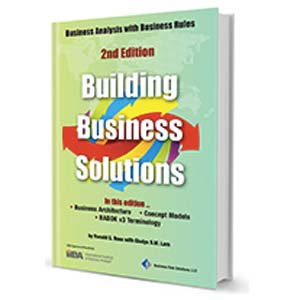More on Business Ownership of Vocabulary
Excerpted from: Business Knowledge Messaging: How to Avoid Business Miscommunication, by Ronald G. Ross, 2022. https://brsolutions.com/business-knowledge-messaging.html
In previous writing I provoked something of a firestorm by maintaining that ownership of business vocabulary is a different matter than ownership of data.[1] I hold that the responsibilities can and should be distinct. Indeed, I see lack of separation as the root cause of a host of problems, not least of which is massive loss of productivity right across the organization.
Let's examine some additional factors with regard to business ownership of vocabulary.
Ownership vs. Management of Vocabulary
First, let's be clear that ownership of vocabulary is not the same as management of vocabulary. Ownership means having authority over a term — literally the authority to mandate its meaning. Management, in contrast, means having functional responsibility for vocabulary-related tasks. Such tasks might include:
- Facilitation and outreach programs.
- Assistance with disambiguation of existing source materials.
- Coordination with external standards bodies.
- Providing indexing and search facilities for business data.
- Support for authoring.
- etc.
Some argue that vocabulary management could be part of a more general Knowledge Management (KM) function within the organization. I'm not so sure. My experience with Knowledge Management is that it is more reactive than proactive, and often focused more on deep vocabulary rather than wide vocabulary (more later).
In any case, where functional responsibility for vocabulary management should lie within an organization is a question every organization should be considering carefully in the Knowledge Age.
What About Adoption?
The power to create a concept is equally the power to adopt a term and/or definition for it from an outside source (with or without modification). If any other business unit wants to change the term and/or definition, the owner still has the final say.
There are great outside sources for vocabulary that can and should be adopted wherever possible. These sources often have their own governing bodies comprised of experts in a particular area. Outside sources are common for:
- Governing and enabling business functions such as accounting, finance, human resources, IT, etc.
- Industry sectors such as aviation, health care, energy, banking, etc.
Never invent if you can adopt!
Deep vs. Wide Vocabulary
In thinking about ownership and management of vocabulary, we should make a distinction between 'deep' vocabulary and 'wide' vocabulary.
Deep vocabulary is particular to a given area of science, engineering, or other know-how.
For example, workers on an oil rig talk about 'shaleshakers', 'mudlogs', 'monkey fingers', 'the kelly', and 'BOPs'. As one vocabulary professional put it, "If you used those same terms with people in the accounting department of that same company, they would look at you (and I say this from experience) like you were speaking Martian."[2]
Deep vocabulary of this kind is found in virtually every organization — it's part of the knowledge that differentiates or enables the business.
Wide vocabulary is the kind needed to knit together (de-silo) a value chain.
For example, in our sovereign wealth fund client, if everyone across the organization doesn't mean the same thing when they say 'investment' or 'asset', miscommunication (and poor data quality) is bound to result (in fact, already has). Standardizing these terms, and creating solid business definitions for them, is a key step in integrating the fund's value chain.
In our experience the wide vocabulary of a business (or line of business) is far more extensive than generally recognized — easily 500–1,000 terms.
While ownership of deep vocabulary can often reside within operational units, ownership of wide vocabulary should tend toward senior management with cross-functional responsibility, possibly even executives.
Why? Consistency of messaging about business knowledge across value chains is critical to overall agility and quality of service (and quality of data). Cross-organizational perspective and authority are key to achieving it.
References
[1] Ronald G. Ross, "Ownership of Vocabulary vs. Ownership of Data: A Fresh Look from the Business Messaging Perspective," Business Rules Journal, Vol. 22, No. 10, (Oct. 2021),
URL: http://www.brcommunity.com/a2021/c078.html
[2] Courtesy Fred Simkin.
# # #
About our Contributor:
Online Interactive Training Series
In response to a great many requests, Business Rule Solutions now offers at-a-distance learning options. No travel, no backlogs, no hassles. Same great instructors, but with schedules, content and pricing designed to meet the special needs of busy professionals.











How to Define Business Terms in Plain English: A Primer
How to Use DecisionSpeak™ and Question Charts (Q-Charts™)
Decision Tables - A Primer: How to Use TableSpeak™
Tabulation of Lists in RuleSpeak®: A Primer - Using "The Following" Clause
Business Agility Manifesto
Business Rules Manifesto
Business Motivation Model
Decision Vocabulary
[Download]
[Download]
Semantics of Business Vocabulary and Business Rules